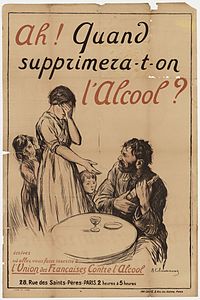
Photo from wikipedia
Introduction Denial is a common feature of alcohol addiction that is apparent in the early and late stages of the disease. Defensive psychological mechanisms and cognitive failure have been reported… Click to show full abstract
Introduction Denial is a common feature of alcohol addiction that is apparent in the early and late stages of the disease. Defensive psychological mechanisms and cognitive failure have been reported as reasons for addiction denial. Effective therapeutic approaches should consider the reasons for anosognosic denial. Aims and objectives The study investigates the correlations between the degree of denial of alcohol addiction and cognitive status of people in the early stages of alcohol dependence. Method Subjects were identified using clinical interview the AUDIT questionnaire investigating compulsive drinking, impaired control of drinking, alcohol tolerance, and symptoms of withdrawal. Results Forty-nine alcoholic patients at early stage of alcohol dependence were identified. At assessment, all had been abstinent for at least 7 days. They reported compulsive drinking, impaired control over it, increased alcohol tolerance, but no withdrawal symptoms followed by relief drinking. The level of denial was defined by summing up the quantitative ratings of awareness of alcohol addiction and its harmful effects. Three groups emerged of non/mild, moderate, and severe levels of addiction denial. Neuropsychological evaluation of verbal memory, logical memory, visual-motor coordination, and motor and mental speed was conducted. Conclusion The identified cognitive deficiencies in the 3 groups were mild. Correlation between the poorer test performance and higher levels of denial was not significant. In the early stages of alcohol addiction, the anosognosic denial appears to be an unconscious ego defense mechanism leading to rejection of all the addiction-related problems. Disclosure of interest The authors have not supplied their declaration of competing interest.
Journal Title: European Psychiatry
Year Published: 2017
Link to full text (if available)
Share on Social Media: Sign Up to like & get
recommendations!